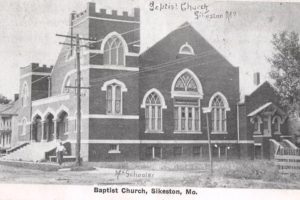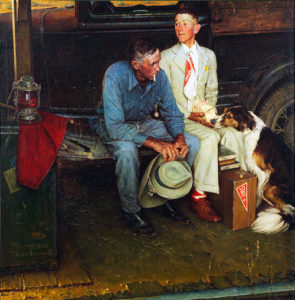 “When two people today engage in an argument, each tends to spend half of his time and energy not in producing evidence to support his point of view but in looking for the hidden motives which are causing his opponent to hold his. If they lose their tempers, instead of saying, ‘You are a fool,’ they say, ‘You are a wicked man.’”
“When two people today engage in an argument, each tends to spend half of his time and energy not in producing evidence to support his point of view but in looking for the hidden motives which are causing his opponent to hold his. If they lose their tempers, instead of saying, ‘You are a fool,’ they say, ‘You are a wicked man.’”
W.H. Auden, “Yeats as an Example” (Kenyon Review, Spring 1948)

 I was nosing around Facebook the other day when I stumbled across a reproduction of a picture postcard that bore on its face an ancient black-and-white photograph of the first church that I can remember attending. Smalltown’s First Baptist Church, an imposing brick structure not far from the business district, was built in 1915. My family worshipped under its roof every Sunday in the early Sixties until my father decided to take his theological trade elsewhere. It was there that I was informed by a Sunday-school teacher of the nonexistence of Santa Claus, a revelation that reduced me to tears.
I was nosing around Facebook the other day when I stumbled across a reproduction of a picture postcard that bore on its face an ancient black-and-white photograph of the first church that I can remember attending. Smalltown’s First Baptist Church, an imposing brick structure not far from the business district, was built in 1915. My family worshipped under its roof every Sunday in the early Sixties until my father decided to take his theological trade elsewhere. It was there that I was informed by a Sunday-school teacher of the nonexistence of Santa Claus, a revelation that reduced me to tears. Maybe so, but the postcard that I found on Facebook is the only picture I’ve ever seen of the old First Baptist Church, and I haven’t been able to track down any others online. Nor is there any way for casual passers-by to know that a church once stood at the corner of South Kingshighway and Greer Avenue. Having been reduced to rubble and, shortly thereafter, an empty lot, the church—or, rather, the site on which it stood—is now the home of Smalltown’s police station. (Irony duly noted.) While the design of the new building was clearly intended to suggest the old church, I can’t help but wonder how many of Smalltown’s present-day residents are aware of that fact.
Maybe so, but the postcard that I found on Facebook is the only picture I’ve ever seen of the old First Baptist Church, and I haven’t been able to track down any others online. Nor is there any way for casual passers-by to know that a church once stood at the corner of South Kingshighway and Greer Avenue. Having been reduced to rubble and, shortly thereafter, an empty lot, the church—or, rather, the site on which it stood—is now the home of Smalltown’s police station. (Irony duly noted.) While the design of the new building was clearly intended to suggest the old church, I can’t help but wonder how many of Smalltown’s present-day residents are aware of that fact. As for me, I’ve only been back to Smalltown a couple of times since my mother died four years ago. Once you’ve lost both of your parents, it’s likely, perhaps inevitable, that your home ties will loosen. But I’m as close as ever to David and Kathy, my brother and sister-in-law, and it also happens that of late I’ve been feeling more than a little bit homesick.
As for me, I’ve only been back to Smalltown a couple of times since my mother died four years ago. Once you’ve lost both of your parents, it’s likely, perhaps inevitable, that your home ties will loosen. But I’m as close as ever to David and Kathy, my brother and sister-in-law, and it also happens that of late I’ve been feeling more than a little bit homesick. Nor are there many people living in Smalltown who knew me when I was young. Virtually all of the friends of my schooldays have moved on, or died. I find it almost impossible to believe that I’ve outlived
Nor are there many people living in Smalltown who knew me when I was young. Virtually all of the friends of my schooldays have moved on, or died. I find it almost impossible to believe that I’ve outlived  Right now, though, I think that I miss most of all a place that no longer exists save in the unfathomable precincts of memory, the Smalltown of fifty years ago. I can see it whenever I close my eyes, but I long to walk among its shadows, and I don’t know when I’ll get the chance to do so again. At present my beloved Mrs. T and my work, which between them are the wellsprings of my life’s meaning, have more urgent claims on my attention. For now I guess I’ll have to settle for phone calls and faded postcards plucked from the web.
Right now, though, I think that I miss most of all a place that no longer exists save in the unfathomable precincts of memory, the Smalltown of fifty years ago. I can see it whenever I close my eyes, but I long to walk among its shadows, and I don’t know when I’ll get the chance to do so again. At present my beloved Mrs. T and my work, which between them are the wellsprings of my life’s meaning, have more urgent claims on my attention. For now I guess I’ll have to settle for phone calls and faded postcards plucked from the web.
 Originally performed in 1978, “Plenty” is a historical panorama, at once intimate and sweeping, set in England, France and Belgium between 1943 and 1962. At the center of the action is Susan (Ms. Weisz), who spied behind Nazi lines when she was 17 years old, an experience so terrifying—and thrilling—that it has permanently scarred her psyche. Nothing about her present-day life can measure up to it, least of all her unhappy marriage to Raymond (Corey Stoll), an ever-so-proper British diplomat. Having lived on the jagged edge of danger, Susan is now expected to comport herself with immaculate tact, suppressing the passionate idealism awakened by her wartime service whenever it collides with the needs of Her Majesty’s Government. Instead, she does exactly what she wants to do at all times, thereby sabotaging Raymond’s career and leading him to conclude that she is not merely devoid of discretion but unstable to the point of actual insanity.
Originally performed in 1978, “Plenty” is a historical panorama, at once intimate and sweeping, set in England, France and Belgium between 1943 and 1962. At the center of the action is Susan (Ms. Weisz), who spied behind Nazi lines when she was 17 years old, an experience so terrifying—and thrilling—that it has permanently scarred her psyche. Nothing about her present-day life can measure up to it, least of all her unhappy marriage to Raymond (Corey Stoll), an ever-so-proper British diplomat. Having lived on the jagged edge of danger, Susan is now expected to comport herself with immaculate tact, suppressing the passionate idealism awakened by her wartime service whenever it collides with the needs of Her Majesty’s Government. Instead, she does exactly what she wants to do at all times, thereby sabotaging Raymond’s career and leading him to conclude that she is not merely devoid of discretion but unstable to the point of actual insanity. “Falsettos,” the William Finn-James Lapine musical that hit big on Broadway in 1992, has now returned there in a well-cast Lincoln Center Theater revival directed by Mr. Lapine with his usual skill. Today, though, its once-controversial subject matter—the decision of a married father (Christian Borle) to leave his wife (Stephanie J. Block) for a man (Andrew Rannells) who dies of AIDS in the second act—has long since become a trusty staple of stage and screen. So how does “Falsettos” hold up now that gay marriage is the law of the land and AIDS has ceased to be an uncommutable death sentence?…
“Falsettos,” the William Finn-James Lapine musical that hit big on Broadway in 1992, has now returned there in a well-cast Lincoln Center Theater revival directed by Mr. Lapine with his usual skill. Today, though, its once-controversial subject matter—the decision of a married father (Christian Borle) to leave his wife (Stephanie J. Block) for a man (Andrew Rannells) who dies of AIDS in the second act—has long since become a trusty staple of stage and screen. So how does “Falsettos” hold up now that gay marriage is the law of the land and AIDS has ceased to be an uncommutable death sentence?… •
•